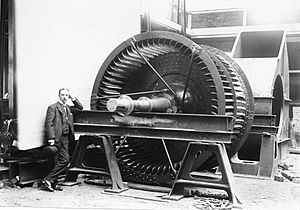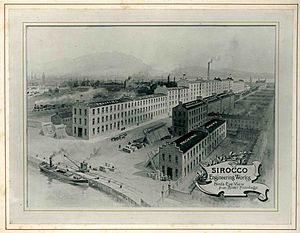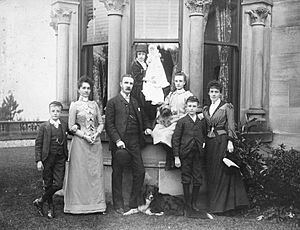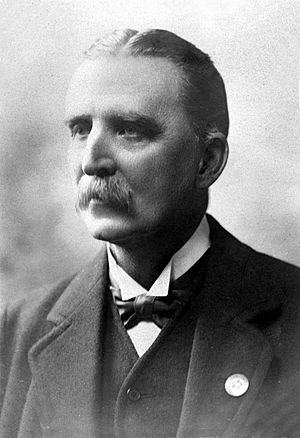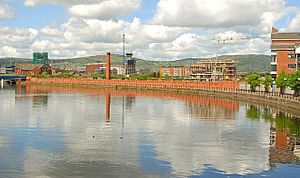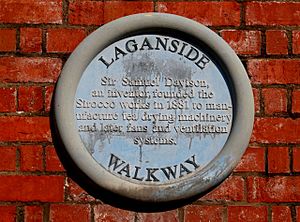Samuel Cleland Davidson facts for kids
Quick facts for kids
Samuel Cleland Davidson
|
|
|---|---|
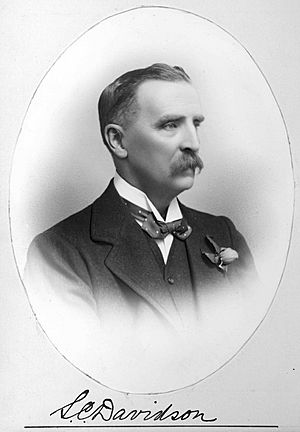
Samuel Cleland Davidson portrait photo and signature
|
|
| Born | 18 November 1846 County Down, Ireland
|
| Died | 18 August 1921 (aged 74) |
| Nationality | British |
| Citizenship | United Kingdom |
| Education | Royal Belfast Academical Institution |
| Occupation | Engineer and inventor |
| Known for | Inventor of air conditioning and founder of the Sirocco Engineering Works in Belfast |
Sir Samuel Cleland Davidson (born November 18, 1846 – died August 18, 1921) was a clever British inventor and engineer. He was given a special honor, Knight Commander of the Order of the British Empire (KBE), by the King. He invented many machines, especially for the tea business. He also created some of the very first air conditioning systems. In 1881, he started his own company, the Sirocco Works, in Belfast.
Contents
Samuel Davidson's Early Life
Samuel Davidson was born in County Down, Ireland, on November 18, 1846. He was the youngest child in his family, who were Ulster Scots. He went to school at the Royal Belfast Academical Institution.
At age 15, he left school to work at a company called William Hastings. This was a civil engineering firm in Belfast. As a teenager, he learned a lot as an apprentice to a surveyor. He also visited his uncle's flax mill, which used power machines. These early experiences taught Samuel to love learning by doing things himself. He also learned to be creative in farming and engineering.
Davidson's Career and Inventions
In 1864, Samuel started working for his father, James Davidson. His father owned a flour mill near where the Sirocco Works would later be built. At this time, the British Empire wanted to grow its own tea in India. This would make the Empire very rich and less dependent on tea from China.
Samuel's father and uncle started a business importing tea. They bought a share in a tea farm in Cachar, India. Samuel's cousin, James, went to India to manage the farm. Later, 17-year-old Samuel and other young men joined him.
Samuel quickly became known as a hard-working and successful farm manager. He used his knowledge of farming and engineering to make the tea farms much better. He also started to use machines for making tea. Before this, making tea was a very difficult process done by hand.
Samuel didn't go to university, so his inventions came from trying new things. He often tried ideas that other engineers thought were impossible. He once said, "An ounce of fact is worth a ton of theory." This meant that showing something worked was better than just talking about why it shouldn't.
Developing Tea Machinery
In 1874, Samuel sold his property in India and came back to Ireland. He started making his tea machines with a company in Belfast. After a year, he went back to India in 1878. He took a portable tea factory with him.
He set up his factory in different places to show tea farmers how well his machines worked. Soon, many orders came in, and his machines became the best in the tea industry. Tea companies even paid him to visit their farms and suggest ways to grow more tea. He also sold hundreds of his simple wheeled hoes, which farmers loved. In 1881, he opened his own factory in Belfast.
The Sirocco Brand and Air Conditioning
Samuel's success with using stoves to move hot air led him to create heating systems for buildings. By the late 1880s, his Sirocco stoves were used in schools and churches. In 1898, he made an even better invention: a powerful centrifugal fan. This fan was much stronger than other fans.
This new fan was first made for drying tea. But it later became the first air conditioning system. One of Samuel's friends said the powerful hot air from the fan reminded him of the Sirocco, a hot wind in the desert. So, Samuel used "Sirocco" as the name for his products and his factory.
Davidson & Co grew into one of Ireland's biggest engineering companies. They made and sold equipment for cooling, drying, heating, and moving air. Samuel invented all of these. He even supplied ventilation fans for the famous ship, the Titanic, which was built right next to his factory. These fans have been seen in photos of the Titanic wreck.
Sirocco's Role in World War I
During World War I, the Sirocco Works made supplies for the British Royal Navy and Merchant Navy. When the German fleet was sunk in 1919, it was found that almost every German ship had Sirocco fans! Samuel also tried to help the war effort by inventing a hand-held grenade launcher. He made prototypes for use in the trenches, where his son Jim was fighting. The American military was about to order many of these when the war ended.
Samuel always saw many uses for his inventions. Newspapers from the late 1800s and early 1900s showed ads for Sirocco products. These ranged from tennis net poles to machines for mines. He also invented a sparkling tea drink. He was good friends with John Dunlop, who invented the pneumatic tire, and they both worked on rubber.
Business Strategies and Values
Samuel was a very smart businessman. He could plan ahead and make big changes when needed. For example, tea was very expensive in the past. Samuel knew that if tea farms and his machines were to make money, tea prices had to drop. So, he opened the Sirocco Bonded Tea Store. He sold tea at a much lower price than usual. This forced bigger tea companies to lower their prices too. Once he achieved this goal, he closed his tea store. He brought the price of tea in Belfast down from five shillings to two shillings per pound.
Samuel was a strong supporter of keeping Ireland part of the British Empire. He believed Irish businesses like his were safer that way. However, he treated everyone fairly. He hired both Protestants and Catholics at the Sirocco Works. When some people demanded he fire his Catholic employees, Samuel refused. He even put armed guards at the factory to protect them.
Family Life
Samuel Cleland Davidson married Clara Mary Coleman in 1873. They had five children: Annie, Clara May, James Samuel, Richard, and Kathleen. Sadly, Annie died as a baby, and Richard died at age 18 from Meningitis.
His son James worked as a general manager in his father's business. James also invented some of his own machines. In 1911, he traveled the world to make business deals in Russia, Japan, and America. Everyone expected James to take over the company from his father.
During World War I, James became a captain in the 13th Royal Ulster Rifles. He was shot and killed by a German sniper on July 1, 1916. This was the first day of the Battle of the Somme. James was 39 years old. After James's death, Samuel's health began to decline. His son-in-law, Frederick Maguire, who was already a senior manager, took over leading the company.
Later Life and Legacy
Samuel Cleland Davidson became a member of the Institution of Mechanical Engineers in 1888. In 1921, King George V gave him the special honor of being knighted. Samuel was too ill to travel to London for the ceremony.
A few months later, Samuel Davidson died on August 18, 1921, in Bangor, County Down. He was buried next to his wife, Clara Mary, in Belfast City Cemetery.
Samuel Davidson's work was honored by the Northern Bank. They featured him on their £50 banknote as part of their "Inventor" series. The note showed tea plants and some of his machines. This banknote was stopped in 2013.
In 1988, the Davidson Group was bought by another company, James Howden & Co. They formed Howden Sirocco Limited, now called Howden UK. Davidson's Sirocco Works factory was eventually closed. In 2009, the building was torn down as part of a project to redevelop the Belfast Waterfront area.
The name "Sirocco Works" still lives on today. The Sirocco Works Football Club was started in 1924 by workers from the factory. The team still plays in the Northern Amateur Football League.
Images for kids
 | John T. Biggers |
 | Thomas Blackshear |
 | Mark Bradford |
 | Beverly Buchanan |


